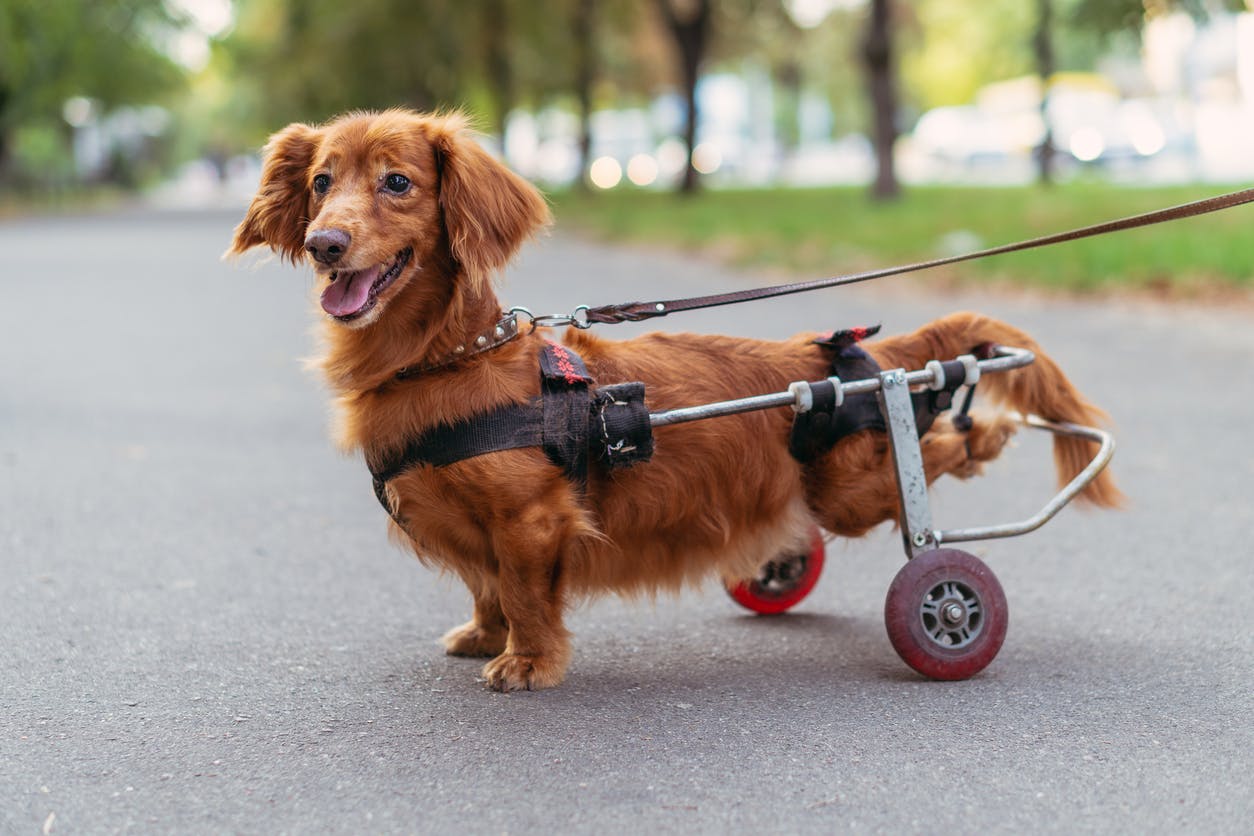Here at Wisdom Panel, we talk a lot about the importance of finding a dog breed that fits your lifestyle well. Of course, breed alone isn’t the only consideration. Age can come into play, as senior pets require different care than puppies. And then there are special needs dogs.
Some dogs have physical or behavioral challenges that create unique requirements when it comes to their care. But that doesn’t make them less worthy of having a family and a lifetime of love. Adopting a dog with special needs can be a life-changing experience. So, let’s explore the benefits of giving a home to a dog with special needs and discuss the special considerations that come with it.
Types of special needs dogs
"Special needs" is a general term with no set definition. Examples of conditions that require unique care include:
Vision or hearing impairment
Blind or deaf dogs rely heavily on their other senses to compensate for their lack of vision or hearing. But you’ll likely need to make special accommodations to create a safe and comfortable environment for them. For example, blind dogs benefit from a consistent environment and may need baby gates to prevent them from falling down stairs. Deaf dogs need hand signals and visual cues and depend on their pet parents to keep them safe from hazards that they can’t hear.
Paralysis or missing limbs
Dogs that are missing multiple limbs or living with paralysis are incredibly resilient and often adapt well to their physical state. Still, they may require special equipment (like a doggie wheelchair) and extra precautions when exercising to ensure they don’t overdo it or put too much stress on their remaining limbs.
Chronic diseases
Diabetes, kidney disease, and Cushing’s disease are just a few chronic diseases with no cure that require therapeutic treatments and regular veterinary visits to manage symptoms and prolong a dog’s quality of life.
Epilepsy
Dogs with epilepsy need careful monitoring, especially during and after seizures. Medication compliance is also crucial to manage and reduce the frequency of seizures.
Behavioral disorders
Anxiety, aggression, and fear are examples of behavioral conditions that may require diligent effort to control or minimize. Helping a dog cope with, or even overcome, behavioral challenges may require a combination of training, environmental management, and medication.
Severe allergies
Some dogs have severe food or environmental allergies that manifest as stomach or skin issues. They may require special diets, shampoos, or medications to keep their symptoms from impacting their quality of life.
These are just a few of the special need circumstances you may encounter. Remember that each dog is unique, and their care requirements may vary even within the same special need category. Consulting with a veterinarian or specialist experienced in caring for dogs with specific conditions is crucial to providing the best possible care.

Benefits of adopting a dog with special needs
When you adopt a special needs dog, you’re giving a safe, stable home to a pup that needs one. But you’ll also get so much back in return.
Unconditional love and loyalty
Most dogs are great at showing their humans how much they love them. But special needs dogs often have an uncanny ability to form deep bonds with their caregivers. They depend on you and seem to understand the extra care and attention they receive and repay it with unwavering love.
Personal Growth and Empathy
Caring for a dog with special needs can teach patience, compassion, and empathy. You learn to see the world through their eyes, to understand their unique challenges, and to celebrate their triumphs, no matter how small.
Inspiration and Resilience
Special needs dogs are fighters who don’t let their challenges define them. They face adversity head-on and have incredible spirits. It’s hard not to be inspired by their resilience and determination.
Five steps to take before adopting a special needs dog
Before you welcome a special needs dog into your home, it’s important to take some time to think through the implications. Here are five things you can do to prepare.
Plan for the financial impact
Caring for a special needs dog may cost more than a dog without health challenges. Ensure your budget allows for extra funds for veterinary care, medications, special diets, and potential surgeries.
Educate yourself on the dog’s unique needs
Understanding your dog’s specific needs is crucial. Research conditions thoroughly and consult with a veterinarian or specialists. If the dog requires daily medications or injections, be sure you feel comfortable administering those. The more you know in advance, the better you can provide for your furry friend.
Create a safe, supportive environment
Make sure your home is set up for your new pup’s arrival. If your dog has mobility issues, consider if ramps or modified furniture may be needed to help them move around comfortably. And always make sure your dog has a quiet, safe spot they can retreat to when they need to decompress.
Find a support network
Caring for a special needs dog can be emotionally challenging at times. Having a group of people, including veterinarians and fellow pet parents, who understand what you’re going through and can offer support and advice helps you get through any tough times.
Be ready to make a long-term commitment
Adopting any dog is a lifelong commitment. But, rehoming a special needs dog may provide additional challenges, both in terms of finding a suitable new home and in the adjustment period the dog would have to endure. So make sure everyone in your household is prepared to take on the responsibilities and is in it for the long haul before you bring a special needs pet home.
Enjoy the ride
Adopting a dog with special needs can be a journey like no other. Be sure to enjoy all the little moments that come with bringing a truly unique pup into your life.















